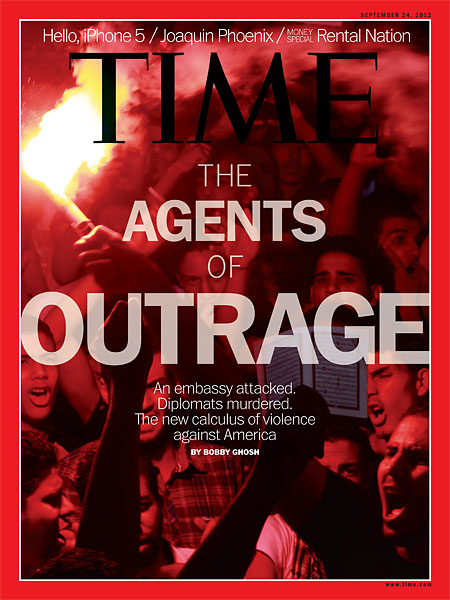 The violence looked spontaneous; it was anything but. Instead it was the product of a sequence of provocations, some mysterious, some obvious. It seemed to start in the U.S., then became magnified in Egypt and was brought to a deadly and sorrowful climax in Libya — all on the 11th anniversary of 9/11. The cast of characters in this tragedy included a shadowy filmmaker, a sinister pastor in Florida, an Egyptian-American Islamophobe, an Egyptian TV host, politically powerful Islamist extremist groups and, just possibly, an al-Qaeda affiliate in Libya. The instigators and executors didn’t work in concert; they probably didn’t even know they were in cahoots. Indeed, some of them would sooner die than knowingly help the others’ causes. Nonetheless, the death of Ambassador Chris Stevens and three other Americans at the U.S. consulate in Benghazi was the result of a collective effort, with grievous consequences.
The violence looked spontaneous; it was anything but. Instead it was the product of a sequence of provocations, some mysterious, some obvious. It seemed to start in the U.S., then became magnified in Egypt and was brought to a deadly and sorrowful climax in Libya — all on the 11th anniversary of 9/11. The cast of characters in this tragedy included a shadowy filmmaker, a sinister pastor in Florida, an Egyptian-American Islamophobe, an Egyptian TV host, politically powerful Islamist extremist groups and, just possibly, an al-Qaeda affiliate in Libya. The instigators and executors didn’t work in concert; they probably didn’t even know they were in cahoots. Indeed, some of them would sooner die than knowingly help the others’ causes. Nonetheless, the death of Ambassador Chris Stevens and three other Americans at the U.S. consulate in Benghazi was the result of a collective effort, with grievous consequences.
As the Obama Administration struggles to contain the fallout of the killings — and even to piece together exactly what happened — there’s an increasing apprehension that this attack may herald a new genre of Middle East crisis. The Arab Spring replaced the harsh order of hated dictators with a flowering of neophyte democracies. But these governments—with weak mandates, ever shifting loyalties and poor security forces—have made the region a more chaotic and unstable place, a place more susceptible than ever to rogue provocateurs fomenting violent upheavals, usually in the name of faith.
(MORE: Ambassador Chris Stevens: The American Who Loved Libya (1960–2012))
Collectively, these hatemongers form a global industry of outrage, working feverishly to give and take offense, frequently over religion, and to ignite the combustible mix of ignorance and suspicion that exists almost as much in the U.S. as in the Arab world. Add to this combination the presence of opportunistic jihadist groups seeking to capitalize on any mayhem, and you can begin to connect the dots between a tawdry little film and the deaths of four American diplomats.
Start with the filmmaker behind Innocence of Muslims, a purported biopic of the Prophet Muhammad that, according to some accounts, sparked the demonstrations in Cairo and Benghazi. He goes by the name Sam Bacile, but almost nothing is known about him. Or even whether he exists. Some reports suggest the name is a pseudonym.
There have been other films about the Prophet, but since Islamic traditions forbid any depiction of Muhammad, Muslim filmmakers tend to focus instead on his contemporaneous followers and foes. In the 1977 film The Message, for instance, Muhammad remains always off camera and is never heard, but other historical figures (including his uncle Hamza, played by Anthony Quinn) address him.
(MORE: The Anti-Muhammad Video: Ridiculous, and Now Deadly Serious)
The film made by Bacile makes no such concessions to Muslim sensibilities. Indeed, showing Muhammad is the film’s only innovation. The accusations it makes about him are rehashed from old Islamophobic tropes; the script is clunky and the acting high-school-ish. The movie was apparently made last year, and although the filmmaker claimed to have spent $5 million on it, the production values suggest a much more modest budget. Before going into hiding in the wake of the violence in Cairo and Benghazi, Bacile (or someone pretending to be him) defiantly told the Associated Press that he regards Islam as “a cancer, period.”
The film was screened in Hollywood early this year but made no waves whatsoever. Bacile then posted a 14-min. series of clips on YouTube in July; that too got no traction. But it caught the attention of Morris Sadek, an Egyptian-American Copt in Washington, D.C., known for incendiary anti-Muslim statements and blog posts. In early September, Sadek stitched together clips of the film and posted them on an Arabic-language blog. He also sent a link to the post in a mass e-mail. In the meantime, the film had attracted a singularly unattractive fan: Terry Jones, pastor of a church in Gainesville, Fla., who is notorious for burning the Koran and performing other Islamophobic stunts. He promoted the film online and added fuel to the flames by posting his own YouTube video, calling for the “trial” of the Prophet, for fraud and other supposed crimes. Jones’ video features an effigy wearing a demon mask and hanging from a noose.
MORE: Death and the American Ambassador: What Happened in Benghazi

